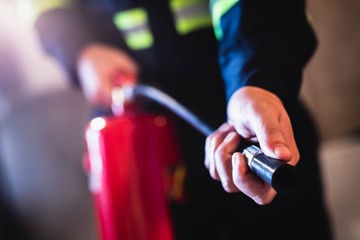Ensuring your home is equipped with the right fire safety tips is crucial to protect your family and property. This guide provides fire safety tips on installing and maintaining smoke detectors, choosing the right fire extinguishers, creating an emergency escape plan, and general fire prevention advice.

Keep your home and family safe by following simple fire safety tips. Installing smoke alarms, having an escape plan, and using fire extinguishers can prevent dangerous situations.
Install smoke alarms in every room of your home, especially in bedrooms and hallways. Test them monthly to ensure they’re working and replace the batteries regularly for optimal safety.
Work with your family to create a fire escape plan, identifying at least two exits from each room. Practice the plan regularly to ensure everyone knows what to do in an emergency.
Place fire extinguishers in key areas like the kitchen, garage, and near exits. Make sure everyone in the household knows how to use them properly to handle small fires effectively.
For additional information, check out Fireplan’s “Fire Safety Plans Vancouver”
Never leave cooking unattended, and keep flammable items like towels and paper towels away from the stove.
Regularly inspect electrical appliances and wiring for damage, and replace frayed or damaged cords immediately to prevent fires.
Keep flammable materials at least three feet away from heat sources such as furnaces, fireplaces, and space heaters.
Smoke outdoors, and ensure cigarettes are fully extinguished before disposal to avoid the risk of fire.
Store flammable items like gasoline and propane in approved containers, away from living areas, and in well-ventilated spaces.
Keep grills at least 10 feet away from structures, and never leave them unattended while cooking to prevent accidental fires.
Install smoke detectors on every level of your home, including the basement. Place them inside each bedroom and outside sleeping areas.
Smoke rises, so mount detectors high on walls or ceilings. Keep them away from windows, doors, and air ducts to avoid drafts that could interfere with operation.
Test smoke detectors monthly by pressing the test button to ensure they function properly and can alert you quickly in case of a fire emergency.
Replace batteries annually or when chirping occurs, and clean detectors regularly to prevent dust from affecting performance and to maintain their sensitivity to smoke.
Replace smoke detectors every 10 years or as recommended by the manufacturer to ensure reliable operation, as sensors degrade over time, reducing effectiveness.
Ensure every room has at least two escape routes, such as doors or windows, to provide alternative exits in case one is blocked.
Designate a safe meeting spot outside, like a tree or mailbox, where everyone can gather after escaping to account for family members.
Conduct fire drills regularly so everyone knows the escape routes and procedures, ensuring they can exit quickly and safely in an emergency.
Smoke rises, so stay low to the ground while exiting to avoid inhaling harmful smoke and maintain better visibility.
Before opening any door, feel it for heat. If it’s hot, use your alternate escape route, as fire may be on the other side.
As you exit, close doors behind you to help contain the fire and smoke, giving you and others more time to escape.
For ordinary combustibles like wood, paper, and cloth.
For flammable liquids like grease, gasoline, and oil.
For electrical equipment fires.
For combustible metals.
For kitchen fires involving oils and fats.
Place fire extinguishers in key locations such as the kitchen, garage, and near exits.
Inspect extinguishers monthly to ensure they are charged and not damaged.
Have extinguishers professionally serviced and recharged annually or after use.
For more detailed information on fire extinguishers, visit NFPA’s Guide to Fire Extinguishers.
Fire safety is crucial for protecting your home and loved ones. By taking proactive measures—such as installing smoke alarms, creating and practicing an escape plan, and having fire extinguishers readily available—you can significantly reduce the risks. Regularly maintaining these safety systems and educating your family on fire response procedures ensures that everyone knows how to react quickly in an emergency. Preparedness and awareness are key to keeping your home safe and secure.
Protect your home and loved ones with expert fire safety guidance. Whether you need advice on creating an emergency plan or want to install smoke detectors, Safe and Secure Locksmith is here to help.